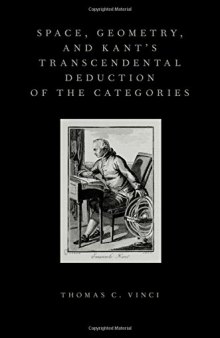دانلود کتاب Space, Geometry, and Kant's Transcendental Deduction of the Categories
by Thomas C. Vinci|
|
عنوان فارسی: فضا ، هندسه و کسر استعلایی کانت از این دسته ها |
 دانلود کتاب
دانلود کتاب
 جزییات کتاب
جزییات کتاب
But this reading encounters an exegetical problem: Kant states in the second part of the Deduction that a major part of what remains to be shown is that empirical intuitions are subject to the categories. How can this be if it has already been shown that intuitions in general are subject to the categories? Vinci calls this the Triviality Problem, and he argues that solving it requires denying the standard reading. In its place he proposes that intuitions in general and empirical intuitions constitute disjoint classes and that, while all intuitions for Kant are unified, there are two kinds of unification: logical unification vs. aesthetic unification. Only the former is due to the categories.
A second major theme of the book is that Kant's Idealism comes in two versions-for laws of nature and for objects of empirical intuition-and that demonstrating these versions is the ultimate goal of the Deduction of the Categories and the similarly structured Deduction of the Concepts of Space, respectively. Vinci shows that the Deductions have the argument structure of an inference to the best explanation for correlated domains of explananda, each arrived at by independent applications of Kantian epistemic and geometrical methods.







 این کتاب رو مطالعه کردید؟ نظر شما چیست؟
این کتاب رو مطالعه کردید؟ نظر شما چیست؟
